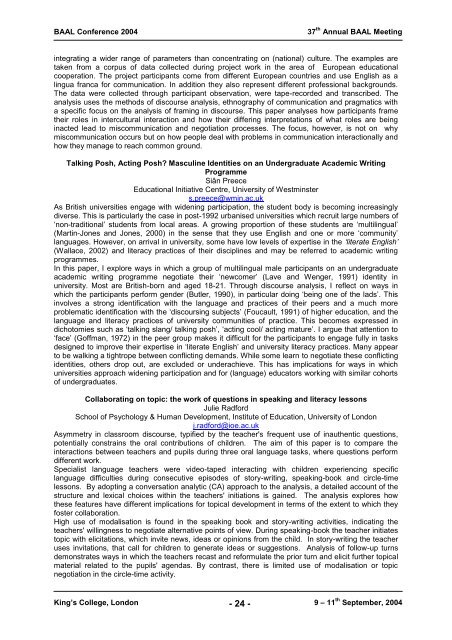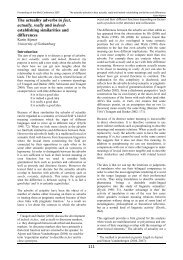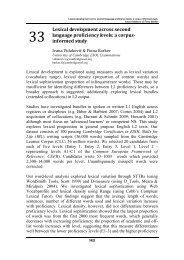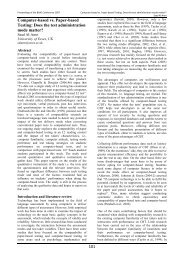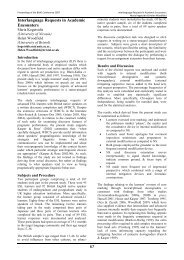Colloquia - British Association for Applied Linguistics
Colloquia - British Association for Applied Linguistics
Colloquia - British Association for Applied Linguistics
Create successful ePaper yourself
Turn your PDF publications into a flip-book with our unique Google optimized e-Paper software.
BAAL Conference 2004 37 th Annual BAAL Meeting<br />
integrating a wider range of parameters than concentrating on (national) culture. The examples are<br />
taken from a corpus of data collected during project work in the area of European educational<br />
cooperation. The project participants come from different European countries and use English as a<br />
lingua franca <strong>for</strong> communication. In addition they also represent different professional backgrounds.<br />
The data were collected through participant observation, were tape-recorded and transcribed. The<br />
analysis uses the methods of discourse analysis, ethnography of communication and pragmatics with<br />
a specific focus on the analysis of framing in discourse. This paper analyses how participants frame<br />
their roles in intercultural interaction and how their differing interpretations of what roles are being<br />
inacted lead to miscommunication and negotiation processes. The focus, however, is not on why<br />
miscommunication occurs but on how people deal with problems in communication interactionally and<br />
how they manage to reach common ground.<br />
Talking Posh, Acting Posh? Masculine Identities on an Undergraduate Academic Writing<br />
Programme<br />
Siân Preece<br />
Educational Initiative Centre, University of Westminster<br />
s.preece@wmin.ac.uk<br />
As <strong>British</strong> universities engage with widening participation, the student body is becoming increasingly<br />
diverse. This is particularly the case in post-1992 urbanised universities which recruit large numbers of<br />
„non-traditional‟ students from local areas. A growing proportion of these students are „multilingual‟<br />
(Martin-Jones and Jones, 2000) in the sense that they use English and one or more „community‟<br />
languages. However, on arrival in university, some have low levels of expertise in the ‘literate English’<br />
(Wallace, 2002) and literacy practices of their disciplines and may be referred to academic writing<br />
programmes.<br />
In this paper, I explore ways in which a group of multilingual male participants on an undergraduate<br />
academic writing programme negotiate their „newcomer‟ (Lave and Wenger, 1991) identity in<br />
university. Most are <strong>British</strong>-born and aged 18-21. Through discourse analysis, I reflect on ways in<br />
which the participants per<strong>for</strong>m gender (Butler, 1990), in particular doing „being one of the lads‟. This<br />
involves a strong identification with the language and practices of their peers and a much more<br />
problematic identification with the „discoursing subjects‟ (Foucault, 1991) of higher education, and the<br />
language and literacy practices of university communities of practice. This becomes expressed in<br />
dichotomies such as „talking slang/ talking posh‟, „acting cool/ acting mature‟. I argue that attention to<br />
„face‟ (Goffman, 1972) in the peer group makes it difficult <strong>for</strong> the participants to engage fully in tasks<br />
designed to improve their expertise in „literate English‟ and university literacy practices. Many appear<br />
to be walking a tightrope between conflicting demands. While some learn to negotiate these conflicting<br />
identities, others drop out, are excluded or underachieve. This has implications <strong>for</strong> ways in which<br />
universities approach widening participation and <strong>for</strong> (language) educators working with similar cohorts<br />
of undergraduates.<br />
Collaborating on topic: the work of questions in speaking and literacy lessons<br />
Julie Rad<strong>for</strong>d<br />
School of Psychology & Human Development, Institute of Education, University of London<br />
j.rad<strong>for</strong>d@ioe.ac.uk<br />
Asymmetry in classroom discourse, typified by the teacher's frequent use of inauthentic questions,<br />
potentially constrains the oral contributions of children. The aim of this paper is to compare the<br />
interactions between teachers and pupils during three oral language tasks, where questions per<strong>for</strong>m<br />
different work.<br />
Specialist language teachers were video-taped interacting with children experiencing specific<br />
language difficulties during consecutive episodes of story-writing, speaking-book and circle-time<br />
lessons. By adopting a conversation analytic (CA) approach to the analysis, a detailed account of the<br />
structure and lexical choices within the teachers' initiations is gained. The analysis explores how<br />
these features have different implications <strong>for</strong> topical development in terms of the extent to which they<br />
foster collaboration.<br />
High use of modalisation is found in the speaking book and story-writing activities, indicating the<br />
teachers' willingness to negotiate alternative points of view. During speaking-book the teacher initiates<br />
topic with elicitations, which invite news, ideas or opinions from the child. In story-writing the teacher<br />
uses invitations, that call <strong>for</strong> children to generate ideas or suggestions. Analysis of follow-up turns<br />
demonstrates ways in which the teachers recast and re<strong>for</strong>mulate the prior turn and elicit further topical<br />
material related to the pupils' agendas. By contrast, there is limited use of modalisation or topic<br />
negotiation in the circle-time activity.<br />
King‟s College, London 9 – 11 th - 24 -<br />
September, 2004


